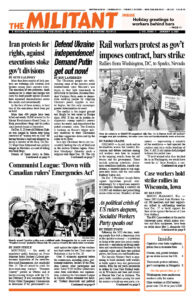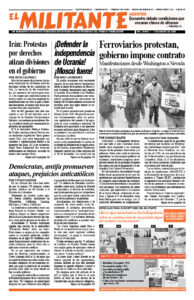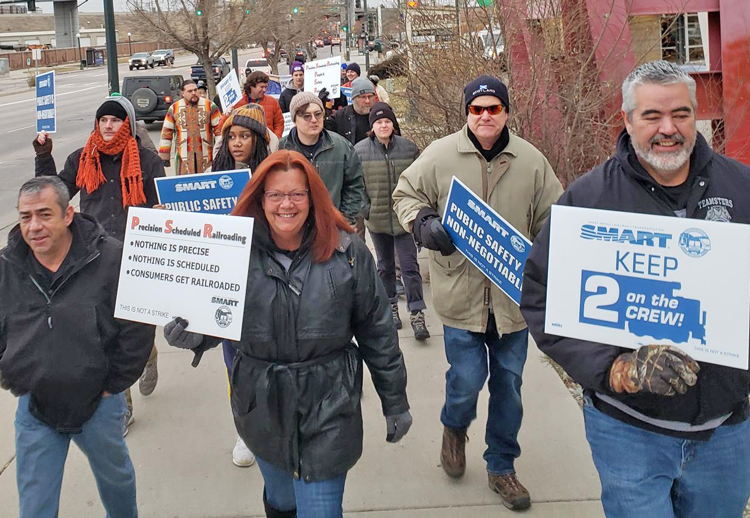CHICAGO — In rail yards and on locomotives across the country discussion and debate continue among rail workers over how to respond to the ongoing attacks from the rail bosses and the government. These include grueling schedules, draconian attendance policies, unsafe conditions, a renewed push to run engineer-only trains and the anti-union Railway Labor Act.
On Dec. 2 President Joseph Biden signed legislation passed overwhelmingly by a bipartisan majority in Congress imposing a contract on 115,000 rail workers and proscribing union strike action. Members of four unions — representing a majority of the workforce — had rejected the contract and set a strike deadline of Dec. 9. All 12 rail unions had pledged to honor the picket lines.
“If we’d wanted what they decided for us in Washington, we would have voted for it,” Jesse Franklin, a conductor at CSX, told the Militant at a Dec. 13 rally of 50 rail workers and supporters in Columbus, Ohio, part of a series of union protests across the country. “They decided to force it on us. That’s why we are out here today.”
Organized by the SMART-TD conductors’ union and the Brotherhood of Locomotive Engineers and Trainmen, the actions were called to protest the federal government’s interference that favored the bosses and to draw attention to the issues rail workers face.
Our fight is “about safety,” Tanner Dalrymple, another conductor, said at the Columbus rally. “And the chance to have a life with our families.”
In recent years the railroads have slashed jobs and imposed punitive attendance policies, and more and more train crews are on call 24/7. The same day that it voted to ban a strike, the Senate rejected a bill to mandate rail workers have access to seven paid sick days per year.
“One of my members had to take his wife to the hospital in an emergency because she needed a hysterectomy. That member is now facing disciplinary action by the company,” Jim Becker, chairman of SMART-TD Local 1043, told the Militant at the Dec. 13 action in Sparks, Nevada.
‘It wasn’t always like this’
“It was not always like this,” Vincent Verna, a national vice president of the Brotherhood of Locomotive Engineers and Trainmen, told a rally of 100 outside the Capitol in Washington, D.C. “We used to be able to take time off because they had enough people.”
Several Democratic Party politicians spoke at the Capitol rally, calling on Biden to issue an executive order granting sick days for rail workers. These included Rep. Alexandria Ocasio-Cortez and House Speaker Nancy Pelosi, who both had voted in favor of barring rail workers from striking, which could have inspired widespread labor solidarity, won sick days and pushed back many of the other attacks by the rail bosses.
“Everyone was hoping for the sick days,” locomotive engineer Matt Wright told the Militant in Galesburg, Illinois. He said that his local “just had 15 people up on investigation for attendance.” He works for a short-line railroad owned by Union Pacific where “it’s all yard work,” he added. “There’s nothing in this contract for us.”
Yard workers in SMART-TD who assemble trains and service local industries made up one of the largest votes against the contract. They’ve faced some of the deepest job cuts in the industry. Many railroads have eliminated brakemen, utility workers and other positions. Some have even imposed single-person “crews,” running switching jobs on the ground with a remote control box.
The Dec. 13 protests drew workers from other unions expressing their solidarity. “We got support from other unions when the [Reno] bus drivers were on strike last year, so I’m here to support,” said Teamster shop steward and UPS driver Tommy Markussen at the Sparks rally. Their contract comes up next year. “UPS is trying to go after pensions for part-time workers. We want to eliminate the second tier of lower pay for our union drivers.”
Rail accidents, deaths on the rise
The latest rail fatality was Walter James Griffin III, a conductor trainee in Bessemer, Alabama. He was riding in the cab of a Norfolk Southern engine when a metal beam protruding from a passing train crashed through the window and killed him on the same day as the rallies.
The conditions rail workers face that have fueled their fight against the bosses was described in the Dec. 15 Kansas City Star. Workers told the paper that “railroads have reduced important employee training, cut back on safety in rail yards and in some cases skipped preventive maintenance measures on railroad equipment.”
It cites data from the Federal Railroad Administration showing that “the rate of accidents per million miles of train travel has increased over the last decade. Likewise, the rates of yard accidents have increased, even as the volume of yard work has declined.”
Participants in the Dec. 13 rallies denounced Precision Scheduled Railroading, which is the name given by many of the rail carriers to their drive to increase profits by cutting crews and running longer trains. “PSR has resulted in a 30% reduction in employment since 2010,” Carl Smith, Colorado State Legislative Director for SMART-TD, told the rally in Denver.
“PSR is a form of management by stress,” Paul Swanson, a retired member of the Brotherhood of Maintenance of Way Employees who took part in the Denver protest, told the Militant. “In an effort to maximize profits an industry keeps cutting back employment levels and investment in infrastructure until the system breaks. Then the industry will only add workers and investment in infrastructure to just above the breaking point.”
Bosses push for 1-person ‘crew’
At a Federal Railroad Administration hearing in Washington the day after the rallies, the major freight carrier bosses renewed their push to implement engineer-only “crews” on long-distance trains. They were arguing against a proposed federal regulation that would require railroads to continue to operate with both a conductor and engineer in most cases. Norfolk Southern spokesman Tom Schautz cynically claimed that getting rid of the onboard conductor will improve workers’ “quality of life,” saying the change would mean more regular work schedules to those conductors who keep their jobs.
“I would not feel safe flying in a commercial airline with one pilot,” SMART-TD Legislative Director Greg Hynes told the hearing. “I would not feel safe with a three-mile-long freight train carrying the most dangerous hazardous material on the planet through my community with only one set of eyes.” A few days earlier, CBS News had reported that airline bosses are lobbying Congress to allow commercial flights with just one pilot!
Commenting on rail workers’ anger over Congress’ bipartisan imposition of the rail contract they had voted down, Philadelphia Inquirer columnist Will Bunch wrote Dec. 4, “Dems and GOP unite to sell out the American worker. Maybe we need a labor party.”
The discussions among rail workers over a road forward — and their determination to fight — will continue.
Naomi Craine is a member of SMART-TD Local 1494. Jacquie Henderson, Jacob Perasso and Glova Scott contributed to this article.


